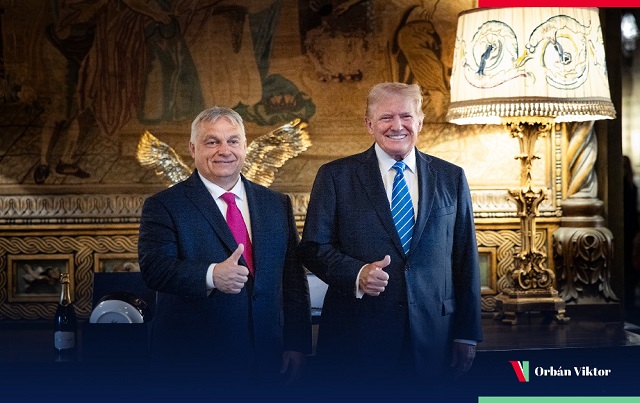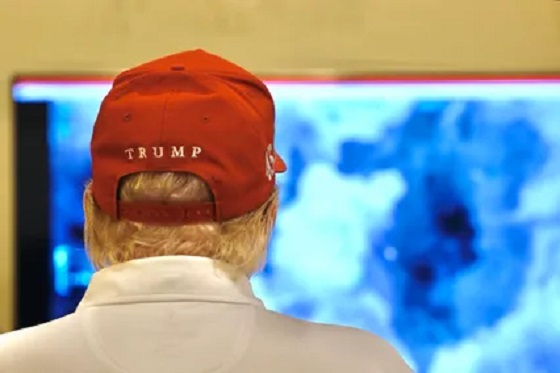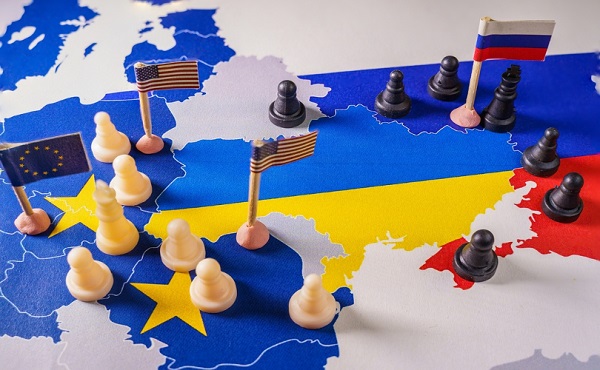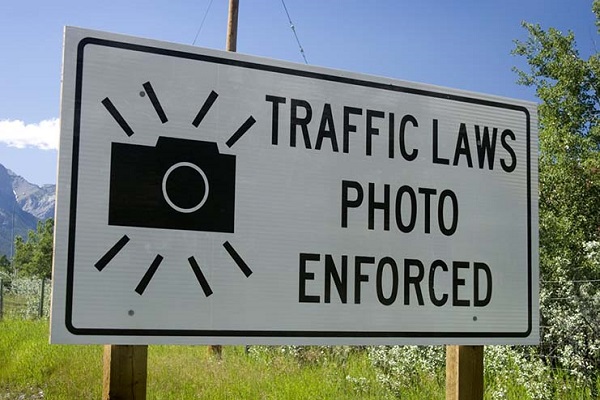conflict
Trump has started negotiations to end the war in Ukraine

For the first time since Russian soldiers entered Ukraine in February 2022, the US is negotiating with Vladimir Putin. Surprisingly it’s not President Biden’s team at work, but President Elect Donald Trump. Trump has been working through Hungary’s Prime Minister Viktor Orban. President Orban traveled to the US to meet with Trump a day before he had an hour long phone conversation with Russian leader Vladimir Putin.
Clearly Trump is looking for at least a quick de-escalation if not an all out end to the conflict in Ukraine. Alex Christoforou and Alexander Mercouris of The Duran podcast explain the current situation.
conflict
“HELL WILL RAIN DOWN”: Trump unleashes U.S. military on Yemeni Houthis

 MxM News
MxM News
Quick Hit:
President Trump ordered a massive military assault on Iranian-backed Houthi forces in Yemen on Saturday, vowing to unleash “overwhelming lethal force” after months of attacks on American and allied vessels in the Red Sea.
Key Details:
-
Trump announced the strikes in a Truth Social post, stating, “Today, I have ordered the United States Military to launch decisive and powerful Military action against the Houthi terrorists in Yemen.”
-
He criticized former President Joe Biden for failing to contain the Houthis, saying his response was “pathetically weak” and emboldened the group’s ongoing attacks on commercial and military vessels.
-
The U.S. Navy’s USS Harry S. Truman carrier strike group, along with three destroyers and a cruiser, launched the assault, targeting radars, air defenses, and missile systems used to disrupt shipping lanes.
CENTCOM Forces Launch Large Scale Operation Against Iran-Backed Houthis in Yemen
On March 15, U.S. Central Command initiated a series of operations consisting of precision strikes against Iran-backed Houthi targets across Yemen to defend American interests, deter enemies, and… pic.twitter.com/u5yx8WneoG
— U.S. Central Command (@CENTCOM) March 15, 2025
Diving Deeper:
President Trump escalated U.S. military action against Iran-backed Houthi rebels on Saturday, ordering airstrikes on targets in Yemen in response to the group’s repeated attacks on Red Sea shipping. Trump, in a Truth Social post, declared that the U.S. military would not tolerate continued aggression and vowed an overwhelming response.
“The Houthi attack on American vessels will not be tolerated,” Trump wrote. “We will use overwhelming lethal force until we have achieved our objective.” He directly warned the Houthis, stating, “YOUR TIME IS UP, AND YOUR ATTACKS MUST STOP, STARTING TODAY. IF THEY DON’T, HELL WILL RAIN DOWN UPON YOU LIKE NOTHING YOU HAVE EVER SEEN BEFORE!”
The strikes, carried out by U.S. Central Command, targeted missile sites, drone launch facilities, and command centers used by the Houthis to strike commercial and military vessels in the Red Sea. U.S. warships and carrier-based fighter jets participated in the mission, marking a significant escalation in efforts to protect international shipping routes.
Trump also issued a direct warning to Iran, demanding that its support for the Houthis “must end immediately.” Addressing Tehran, Trump wrote, “Do NOT threaten the American People, their President…or Worldwide shipping lanes. If you do, BEWARE, because America will hold you fully accountable and we won’t be nice about it!”
The strikes come after more than a year of escalating attacks by the Houthis, who have targeted over 100 merchant vessels, sunk at least two, and killed multiple sailors since the Israel-Hamas war began. Trump pointed to Biden’s failures in handling the crisis, noting that “it has been over a year since a U.S.-flagged commercial ship safely sailed through the Suez Canal, the Red Sea, or the Gulf of Aden.”
With Trump’s order, the U.S. is making clear that hostile actions in the Red Sea will not go unanswered. As military operations continue, all eyes will be on whether the Houthis and their Iranian backers heed the warning—or face even greater firepower from the U.S. military.
conflict
EU leaders escalate war rhetoric with Russia in stark departure from Trump’s peace push

From LifeSiteNews
By Frank Wright
Germany’s leading academic authority on its army has said that Europe’s depleted armed forces would be “washed away” by Russia in weeks, and that it could take at least 15 years before Germany was ready for war.
Last night’s European Council summit responded to Donald Trump’s moves to end the war in Ukraine with a commitment to massive European rearmament.
The EU Council published a statement that, “In 2025, it will provide Ukraine with EUR 30.6 billion” and “increased military support” to Ukraine and proposes “a new EU instrument to provide Member States with loans backed by the EU budget of up to EUR 150 billion” in support to “non-EU members” to rebuild “defense.”
The extraordinary announcement comes two days after EU Chief Commissioner Ursula von der Leyen, an elected MEP appointed to the powerful leadership position by other MEPs, proposed to “rearm Europe” with the release of up to 800 billion euros ($867 billion) in funding. Details on how the money will be raised are set to be finalized later in March.
European and British statements on this issue directly contradict and defy moves towards a durable peace made by the Trump administration. They have also been met with stern rebukes from Russia.
Reuters reported two days ago that Trump had vowed to “end this senseless war” and “stop the killing”:
Trump also said he had been in “serious discussions with Russia” and had “received strong signals that they are ready for peace.”
“Wouldn’t that be beautiful?” he said. “It’s time to stop this madness. It’s time to halt the killing. It’s time to end this senseless war. If you want to end wars you have to talk to both sides.”
Trump is attempting to return the Western world back to the traditions of international diplomacy before and during international conflicts to save lives and prevent unnecessary massive destruction.
This is a major turn away from the top priority given to military power in recent decades. That appears to have been driven by globalist forces, including giant military-industrial complexes, moneylenders, and globalist investment companies like Blackrock who greatly profit from continuous war.
The Russians responded with “concern” over the “remilitarization” of Europe, with spokesman Dmitry Peskov saying the “confrontational rhetoric and confrontational thinking” from Europe goes against efforts to reach a peaceful resolution to the Ukraine conflict.
France – nuclear escalation?
On Wednesday evening French President Emmanuel Macron made a direct address to the French nation in which he described Russia as a “threat to France and Europe” and said he had decided “to open the strategic debate on the protection of our allies on the European continent by our (nuclear) deterrent.” France is the only nuclear armed member state in the EU.
Russian Foreign Minister Sergei Lavrov said Macron’s speech was a “threat to Russia.”
“If he considers us a threat, gathers a meeting of the chiefs of staff of European countries and Britain, says that it is necessary to use nuclear weapons, to prepare for the use of nuclear weapons against Russia, this is certainly a threat,” Lavrov stated.
Russian President Vladimir Putin has repeatedly emphasized Russia has no intention of invading any other nation or trying to resurrect the Soviet Union. It has been having trouble enough trying to protect endangered Russian-speaking Ukrainians in Eastern Ukraine for the past three years.
There has been no evidence indicating Russia is planning or even capable of invading and conquering other nations, but it has been forced to prepare to repel possible attacks in response to increasing hostility and unwillingness to dialogue from Western globalist leaders.
Reliable analysts have emphasized that the CIA and other deep state entities in the U.S. and Europe, in order to justify their massive military spending and Russian regime change goal, are the ones who have been spreading false rumors that Russia has expansionist objectives.
Putin referred to Macron’s comments with a warning from history:
Some people still can’t sit still. There are still people who want to go back to the times of Napoleon, forgetting how it ended.
In a further sign that the U.S. is pursuing peace independently of the Europeans, Trump has suspended all military aid to Ukraine and cut off U.S. intelligence sharing, moves which dramatically reduce the war fighting capability of the Zelensky regime.
The EU-led initiative to fund European rearmament comes days after U.K. Prime Minister Keir Starmer called for a “coalition of the willing” to send troops to Ukraine and continue the supply of arms – whilst talk increases of Zelensky himself being replaced.
“We have to learn from the mistakes of the past, we cannot accept a weak deal which Russia can breach with ease, instead any deal must be backed by strength,” Starmer said, while failing to mention any nations actually willing to join his initiative. So far, none have – though suggestions have been made.
Western nations have been the ones breaching one agreement after another with Russia. Some of those are the promise to not expand NATO “one inch eastward” at the time of the dissolution of the Soviet Union, plus the April 1,2022 Ukraine/Russia initialed agreement in Istanbul to end the Ukraine war, among others.
Starmer’s claim to place “boots on the ground, and planes in the air” did not attract any pledges of support from any European nation. A U.K. deal was signed agreeing to a “loan” of over £1.5 billion ($1.94 billion approx.) to permit Ukraine to purchase British missiles, which have not yet been manufactured and could not in fact be aimed or fired without U.S. intelligence and guidance systems.
Starmer’s bold statements produced a stern response from Russia, whose chief diplomat reminded the world that any placement of NATO troops in Ukraine would be seen as a declaration of war.
Speaking ahead of yesterday’s EU-led Ukraine summit, Lavrov told reporters in Moscow, “We see no room for compromise,” explaining that sending European troops to Ukraine would mean the “undisguised involvement of NATO countries in a war against the Russian Federation. It’s impossible to allow this.”
Responding to Macron’s televised address, Lavrov added that Macron wished to “fight Russia,” explaining the thinking behind the French president’s outburst:
They said directly “We need to conquer Russia, we need to defeat Russia.”
He [Macron] apparently wants the same thing, but for some reason he says that we need to fight Russia so that it does not defeat France.
Rhetoric and reality
The reality of European and British military capability is simply not reflected in any of these statements. Reports over the last few years have consistently shown that there is in fact no realistic European military power to confront the Russians.
Germany’s leading academic authority on its army has said that Europe’s depleted armed forces would be “washed away” by Russia in weeks, and that it could take at least 15 years before Germany was ready for war.
Speaking at a Berlin defense conference in November 2023, German historian Sönke Neitzel told military chiefs that in the case of a war with Russia, Germany’s soldiers “can only die” in a war they will certainly lose:
We are going to stand by the coffins at the soldiers’ graves and we are going to be asked: “What have you done?” We will have to explain to the mothers and the fathers why the soldiers could not fulfill their jobs. And at the moment we can only die gallantly if there’s a war.
Neitzel warned that men will be sent to certain death by their political leaders:
It’s very clear: if our armed forces are going to fight, they will die without drones, air defenses, without enough supplies. Are we now clear enough on our message [to Germany’s leaders]? They are going to die and it’s your responsibility.
In an updated report published March 7, Bloomberg reports that Europe’s “undersized and fragmented” forces would run out of ammunition within days and cannot manufacture sufficient gunpowder.
“Europe’s Defenses Risk Faltering Within Weeks Without US Support” the report says, noting that, “If attacked, Europe’s ammunition stockpiles could run low within days and rearming will take years.”
A report from the U.K.’s Guardian noted last week that the EU “spends more on Russian oil and gas than financial aid to Ukraine,” saying it had purchased “22 billion euros of fossil fuels” in 2024, against “19 billion in aid” to Kiev.
Real war not realistic
Why are EU and British leaders talking war with no realistic chance of fighting one? U.S. moves to scale down and possibly withdraw from NATO spell the end of the alliance, of course, but the wider implications are obvious for the remaining liberal-globalist governments.
Britain, France, Germany, and the EU itself are led by a political establishment whose only hope of unity is in forging a war coalition in a battle they cannot win. As the “Russianist” Professor Gilbert Doctorow has noted, this spells doom for a liberal coalition which has decided to oppose the United States.
“We have moved on from observations of people like myself from the sidelines saying that the leadership in Europe is not living in the real world but they’re living in a bubble,” Doctorow told Judge Napolitano this week.
“What we have now is the end game – and they have created it for themselves.”
The Ukraine war was never going to be won, and a new war between Russia and the liberals of Europe likewise has no basis in military reality. The moves by these failing states is a desperate bid for unity and relevance in a world which no longer corresponds to their values.
Alone among 27 EU member states in opposing increased arms supplies to Ukraine is Hungary. Its leader, Viktor Orbán, famously defined the values of the liberal order as “LGBT, open borders, and war.”
To protect itself from the widespread rejection of these “values” and the globalist agenda they project, the British and EU liberals have implemented totalitarian restrictions on free speech – and even thought and prayer – and have effectively suspended democracy in refusing to respect the results of elections while dramatically increasing digital surveillance and censorship efforts to maintain control of a narrative which has parted company with reality.
The EU initiative to do so is ridiculously called “The European Democracy Shield.”
As Doctorow told Judge Napolitano, it can only be a matter of time before the pro-war parties without an army part company with political power, too. The outbreak of peace is fatal to them, as these leaders have all invested their political capital in the black hole of crime and corruption which is another ugly dimension of reality to the failed proxy war in Ukraine.
Leaders like Von der Leyen, Macron, and Starmer do not fear the lights going out all over Europe. They fear the illumination of the darkness they have used their nations’ wealth to fund in Ukraine, which has been defended by years of outrageous lies. Having fought so long to keep their nations in the dark, the European liberal order is panicked into talk of Armageddon by the fear of the lights coming on at last. It is the end of their world that is nigh. Not ours.
-

 2025 Federal Election1 day ago
2025 Federal Election1 day agoWEF video shows Mark Carney pushing financial ‘revolution’ based on ‘net zero’ goals
-

 Break The Needle2 days ago
Break The Needle2 days agoWhy psychedelic therapy is stuck in the waiting room
-

 2025 Federal Election2 days ago
2025 Federal Election2 days agoThree cheers for Poilievre’s alcohol tax cut
-

 2025 Federal Election2 days ago
2025 Federal Election2 days agoMORE OF THE SAME: Mark Carney Admits He Will Not Repeal the Liberal’s Bill C-69 – The ‘No Pipelines’ Bill
-

 2025 Federal Election2 days ago
2025 Federal Election2 days ago‘Coordinated and Alarming’: Allegations of Chinese Voter Suppression in 2021 Race That Flipped Toronto Riding to Liberals and Paul Chiang
-

 2025 Federal Election1 day ago
2025 Federal Election1 day ago‘I’m Cautiously Optimistic’: Doug Ford Strongly Recommends Canada ‘Not To Retaliate’ Against Trump’s Tariffs
-

 Automotive2 days ago
Automotive2 days agoTrump Must Act to Halt the Tesla Terror Campaign
-

 Business1 day ago
Business1 day agoCanada may escape the worst as Trump declares America’s economic independence with Liberation Day tariffs









